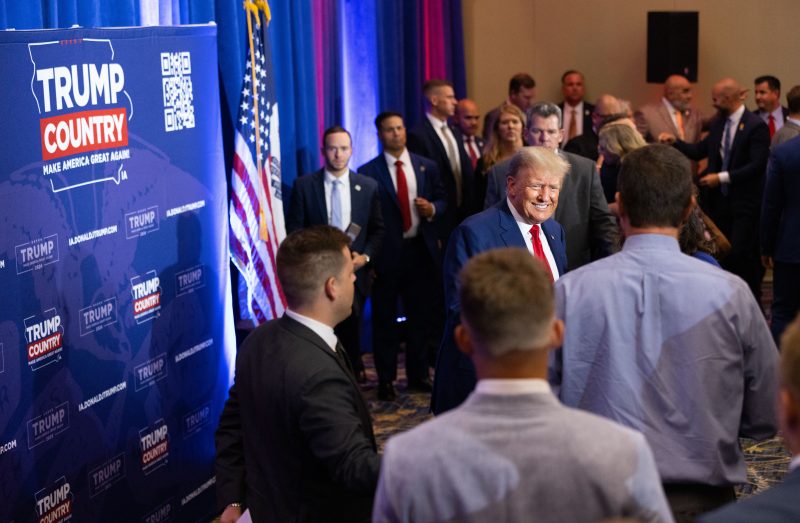If anyone not named Donald Trump is to win the 2024 Republican presidential nomination, someone not named Donald Trump is probably going to have to win the first contest, in Iowa.
The state’s caucuses were the only contest Trump lost before Super Tuesday in 2016. While Trump was not the only future nominee to lose Iowa, it’s a state that would seem accessible for his opponents. And given that the former president is the overwhelming favorite, his winning there would threaten to solidify the sense of inevitability surrounding his renomination.
High-quality polling has been scarce, but that’s now changing. The New York Times and Siena College on Friday released a hugely detailed Iowa poll that provides some hints about the candidates’ relative paths to victories.
In short, Trump isn’t a shoo-in, but you’ve really got to strain to find arguments for his being overtaken — at least at this point.
The top line is that Trump holds a wide lead, as he does in virtually every poll. But it’s smaller than his national lead. While he’s ahead by nearly 40 points nationally, his margin in the new Iowa poll is 24 points over Florida Gov. Ron DeSantis (R), 44 percent to 20 percent.
DeSantis had dropped down near Sen. Tim Scott (R-S.C.) in a Fox Business poll of likely voters in Iowa a couple of weeks ago, but this new poll suggests that he remains Trump’s main opponent in the first contest, at least for now.
Can DeSantis or anyone else make up the gap?
The Times-Siena poll echoes its national survey in suggesting that less than one-quarter of Iowa voters are firmly committed to Trump. Trump’s support is at 44 percent, with a little more than half of those supporters saying they’re considering only Trump. So around three-quarters of voters are at least theoretically available to other candidates.
And more actually say they are not considering Trump than say they are considering only him. More than one-third say Trump isn’t on the table for them. To the extent an opponent (like DeSantis) can make themselves the clear Trump alternative, there’s a significant base to be had there.
But that’s a big if, especially since Iowa’s is the first contest and generally features lots of candidates who split up the vote. What’s more, DeSantis closes the gap only slightly in a hypothetical head-to-head matchup, going from a deficit of 24 points in a crowded field to down 16 one-on-one.
DeSantis’s problem is that his signature issues don’t appear to be landing. For example, voters strongly prefer a candidate who emphasizes “law and order” and the border to one who focuses on defeating “woke” ideology, 67 to 24 percent. Even DeSantis backers strongly prefer the former, despite DeSantis’s extensive focus on culture-war issues and attacks on Disney and Bud Light.
As for Trump’s new, third indictment — this one over his attempts to overturn the 2020 election — the idea that his legal jeopardy is some kind of silver bullet also appears faulty. Fully 76 percent of likely Iowa caucus voters agree that Trump was “just exercising his right to contest the election,” while only 19 percent say he went too far and “threatened American democracy.”
(While this could be an issue if Trump is convicted or as people learn more, the current data suggests it’s just not a concern right now. The poll wasn’t even about whether Trump broke the law.)
But if we’re looking hard, there are some signs that perhaps voters could be persuaded to go a different direction.
The poll asked voters to compare Trump to DeSantis on a series of attributes. Trump’s biggest advantages were on being a “strong leader” (62 to 31 percent) and the perception that he “gets things done” (65 to 26 percent). But electability was closer (50 to 40 percent, Trump), and DeSantis held a wide lead on morality (57 to 29 percent).
Perhaps most surprising, DeSantis led on an issue that would seem to be more in Trump’s wheelhouse: likability. A majority — 51 percent — said “likable” described DeSantis more, while just 38 percent said it described Trump more.
This despite Trump’s long-standing rapport with the GOP base and DeSantis being regarded by some as something of a cold and wooden candidate. (DeSantis during a 2018 gubernatorial debate was even advised to write “likable” at the top of his notepad as a reminder.)
Make of that what you will, but it’s certainly counter to the conventional wisdom.
And it’s not the only way the image ratings caught our eye. Trump still inspires more passionate support than DeSantis, with 49 percent holding a “very favorable” opinion of him, compared with just 29 percent for DeSantis. But the big leader on this measure? Iowa Gov. Kim Reynolds (R), of whom 68 percent hold a “very favorable” opinion — far more even than Trump.
Reynolds has said she won’t endorse in the primary, but her relationship with Trump has become fractured, with the former president attacking her for not endorsing him. These numbers suggest she commands a wider true base of support, and to the extent that DeSantis can align with her — which his super PAC has set about attempting — perhaps that helps on the margins.
Of course, DeSantis and the others need more than just help on the margins; they need the race to be recast. And for now, that’s still over the horizon.
